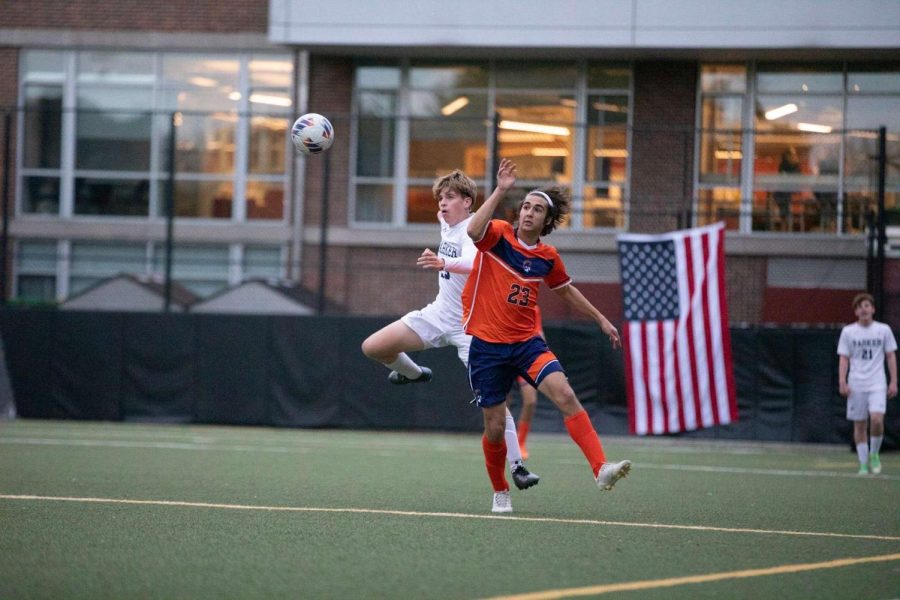Seniority vs Skill: Dedication Should Determine Varsity Spots
Sophomore Bear Beghe seen fighting for a ball during a road game at Francis Parker.
You exit the court, field, or track dripping with sweat. This is finally the year. You practiced your sport all summer—going to open gyms and training with teammates whenever possible. Tryouts went well. A bit more crowded than anticipated, but you have built a strong relationship with the coach. The next day, the email hits you like a freight train: you were cut. And someone who did make the team: a senior who has not played since freshman year. Is it fair?
Seniority plays a significant role in determining who will make varsity teams at Latin, and coaches have to grapple with how much it matters in contrast to skill. Some empathize with the older athletes, as underclassmen will have a chance to support the team in the coming years. Others do not. Realistically, the answer lies between age and skill.
The top factor in choosing who will be placed on varsity-level teams should be demonstrated commitment. The student-athletes who prove themselves to both coaches and captains by going the extra mile are ultimately most deserving of a roster spot, regardless of other factors.
While there are scenarios in which seniors show little interest in a sport until deciding to play at the last minute, the vast majority care deeply about athletics. Even those with less inherent athletic ability value being part of a team. Maintaining a healthy activity after school, being a member of a tight-knit group with common goals, and having fun playing the sport they love is why students practice and train constantly.
Although I think that dedication should determine who makes it onto a varsity team, playing time should be assigned by skill, as the priority for Latin’s varsity athletics should be winning. While a team can afford to put less skilled players on the roster if they provide value in other ways, putting them on the field doesn’t make complete sense. If a senior does not receive their desired playing time, they can look for ways to positively impact the team in other capacities or leave the team. For any athletic program, including a smaller school like Latin, coaches are hired to achieve competitive excellence, not to ensure upperclassmen play. However, the coach is responsible for giving those who are committed to improvement and leadership the opportunity to prove themselves. In other words, they can ensure that a senior who gives their full effort to every team activity for their four years at Latin is not neglected or cut.
A kinder alternative offered to upperclassmen, specifically juniors, worthy of playing time but who may not have a spot on varsity, is the option to play on JV. While the concept does not engage everyone and might be considered embarrassing, the dynamics of a JV team provide similar benefits to being on varsity. The same logic can apply to younger students who can begin the year on JV, work their way up by proving their leadership skills and talent, and eventually play for varsity by the end of the season. Yes, being labeled a floater is unappealing to some, but it leaves the door open for gaining more in-game experience while striving toward the end goal of contributing to varsity.
Dedication can often be confused with seniority, as upperclassmen have the most opportunities to demonstrate why they care. Age does not matter when it comes to building a connection with a coach, but experience does. Those who practice over the summer, go to open gyms, and train with teammates should be prioritized. I’d like to think that despite the outcries of talented freshmen not yet ready to play at the highest level and seniors trying to make varsity as newcomers, coaches feel the same way.

























































Zach McArthur • Feb 2, 2023 at 7:31 am
Spencer,
I think that the Latin athletics program has historically done a good job of being inclusive while remaining competitive at the varsity level. I went to a large public high school and cuts were made in a much more impersonal way, skilled sophomores always making the team over average returning seniors with little thought for the dedication that you believe so important. I like that most teams at Latin reward seniors who have put in their time with a spot on the team and I agree with you that making the team and earning playing time are two different things. I think that coaches should be clear with less-skilled seniors about their likely role on a team and let the senior decide they want to come to practice every day and be a leader even if they won’t see the court or field on game days.